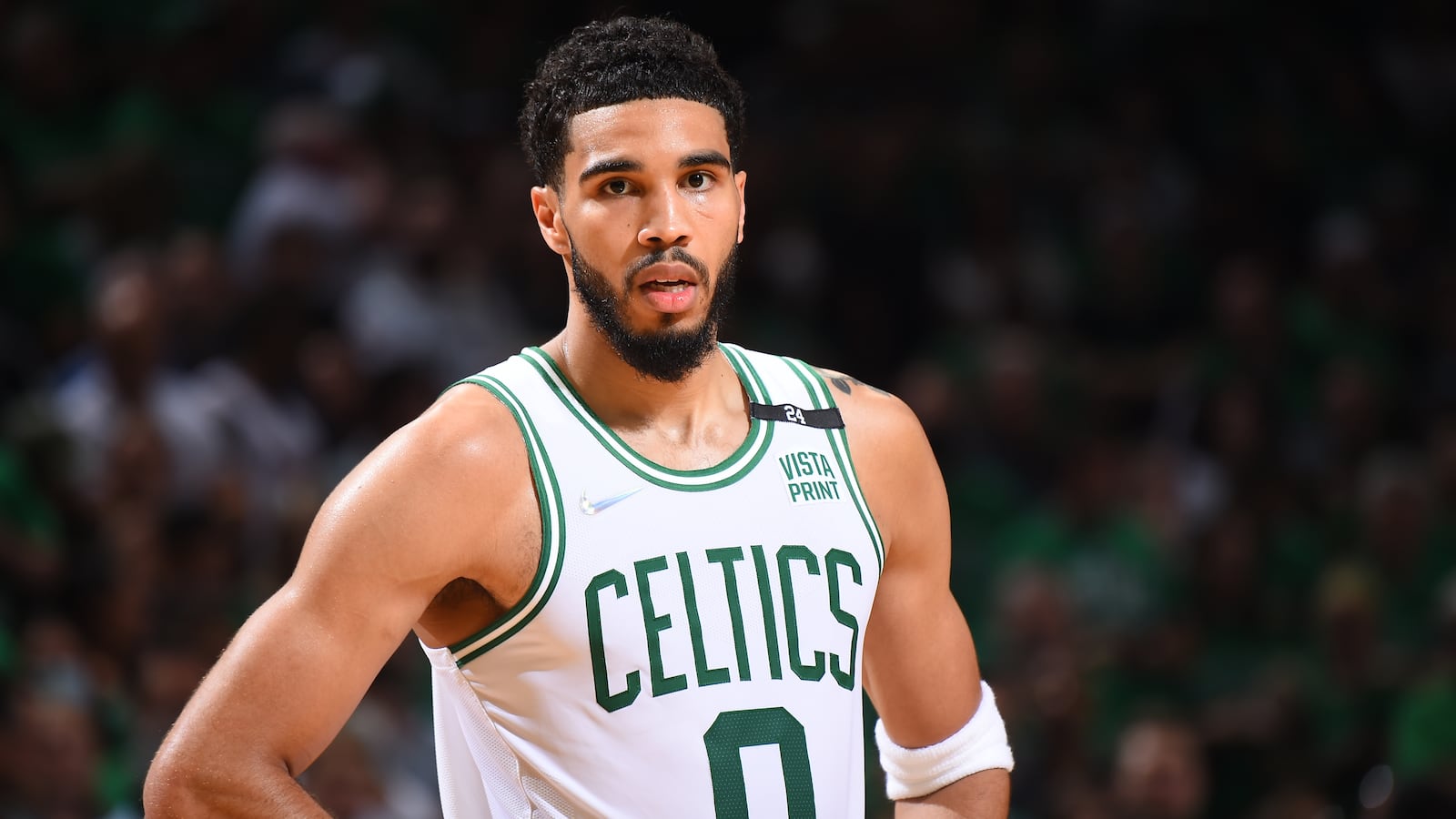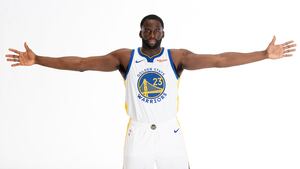As of publication, the wretched Boston Celtics are up 2-1 on the less wretched Golden State Warriors in the NBA Finals. This series has sucked. Three games, three blowouts. A wave of inevitably is crashing on Golden State, playing at a disadvantage against a team full of young players utilizing a swarming, suffocating defense.
Once the two-way terror of the NBA, Golden State seems to have arrived here through force of habit, beneficiaries of a Western Conference full of teams that were either too young or too cursed to will themselves to a showdown with Boston. Draymond Green, one of the outstanding talents in the history of the league, is unwinding, physically unable to manipulate the space of the game as he once did. Klay Thompson is coming off a long time in the injured box and looks rusty. The Warriors’ supporting cast is…eclectic? Strange? Inconsistent? Weird? Two disappointing No. 1 overall picks, NBA WD-40 Jordan Poole, and Andre Iguodala collecting some bizarre old-man minutes purely out of respect is not exactly a 2014 Spurs-style murderer’s row coming off the bench.
Steph Curry, the most innovative NBA player since Kareem, has been the team’s only bright spot, driving and drilling threes with uncanny precision, hell-bent on beating the Celtics by himself while everyone else wades through the dumpster of advancing age. If you can make yourself believe in the prospect of it happening, it’s because of his stupendous talent, yes, but also the devastating dullness of the team he is facing down. The Warriors made the finals out of pure entropy, but the Celtics’ road to this point was somehow even worse. Two seven-game series against teams nursing catastrophic injuries, surviving what would have been an all-time embarrassing comeback by a nut hair, the kind of rote, uninspired system-ball that is supposed to get filtered out by the gauntlet of the playoffs.
The Celtics’ best player is Jayson Tatum. Tatum is a big wing player who handles, scores, passes. Where Curry blew the door open, shifting the perception of what works on a basketball court forever, Tatum seems like he was engineered by someone trying to create a perfectly inoffensive, functional “basketball star”—an uninteresting assemblage of better-than-average skills, all working toward victory. He is exactly everything you want when your team drafts a player, and not one thing aside from that.
For years, I fooled myself into insisting he was overrated, but the depth of his achievements over the years have convinced me otherwise. Jayson Tatum is an excellent NBA player. But what’s so frustrating is he’s also insanely rote, lacking the touch of madness that a viewer wants in a great athlete. The dullness that Tatum produces moment to moment should not be rewarded. It should be smothered out, relegated to the bench. It should play for 10 years and retire comfortably, never to be seen again. And yet, here it is, and here he is: banality itself living a life in the sun, two wins away from an NBA title.
Why watch sports? If you ask me, it’s those moments when the pressure and the madness of this thing requires the lunatics who manage to hoist themselves into its orbit to push themselves to the absolute limits of physical exertion and spatial creativity in service of acquiring two measly points; when genius digs itself from an impossible situation through will and special intellectual force; when an athlete seems like they are bending reality. Great NBA players have something about their game that defies logic and leaves an impression on the viewer. I could list these little things for hours. LeBron making so much out of a jump shot that it looks jury-rigged. The obscene improvisational genius of Nikola Jokic. Curry’s shooting form is so precise that it unsettles you if you think about it too long. It’s unnatural, biomechanical. Durant’s limbs, longer than you could ever imagine, are languid and loopy in repose and so controlled and graceful in movement. Giannis, once a cute, smoothie-loving teenager, is like an inevitable force these days, a seven-foot-tall cannonball of pure, straightforward motion that always seems like it’s streaking downhill.
Even irritants make you feel something. Draymond is not what he once was at present, but when he was the best defender in the league, watching him devour space with just his wingspan and spatial intuition was mind-bending. James Harden is a rank grifter who abuses the laws of the court, but the way he controls his body to manage that grift is nothing short of pure genius. Chris Paul acts like Napoleon on the hardwood, and scrapes for every inch of advantage he can manage. These guys drive you crazy but they make you feel something—they bend themselves and the world. They warp reality for the sake of the game, and they make you feel something in the process.
Tatum does not warp reality. He is just big enough, just skilled enough, just aware enough to do what basketball teams need on the court, and he does it without bending himself. Every basketball problem is a Gordian knot, and he is a sword falling on it, one after another into eternity. Drive, dish, shoot, score, defend, and so on and so forth.
He’s not even unique in this. Clippers forward Kawhi Leonard is also on an eternal quest to make basketball easy and simple night after night. But at least Kawhi has the decency to comport himself like a monumental weirdo, the Board Man of your nightmares, devouring his opponents without burping or blinking.
Tatum is jus normal. Wakes up normal, acts normal all damn day, plays basketball normal, goes to bed normal. He has nothing to latch onto. And yet, here we are, with Tatum two wins away from becoming the most accomplished-on-paper player of his generation, outstripping Slovenian genius Luka Doncic, irritating volume gunner Devin Booker, Jokic, and a handful of other, better, livelier players, all with a game and a vibe so boring that the only stylistic adjectives that apply to his whole project is “smooth,” which is just a euphemism for boring.
But for some people, this little twist of fate will be enough. Because some people, many people don’t watch sports for the reality-bending magic of the human body. They watch sports because they like victory. They like winning—seeing winning, predicting winning. They like associating themselves with winning, so that when someone wins, they can latch onto it and co-opt some of that winner’s energy for themselves. When a wild game happens and Jimmy Butler, a self-made hero who clawed his way into the NBA from the juco swamp, comes a millimeter away from reaching up from the grave and throwing the Celtics in a trash dump forever, they don’t remember Butler, or care about Butler— they care about winning, the person who won, and they ascribe some mystic power to their slight victory, no matter how dull or uninspiring it is to anyone watching with a shred of aesthetic discernment.
For these people, the braying masses who celebrate Tom Brady and Jeter, who run their mouths on TV spinning dull narratives about greatness or the moment or whatever, Jayton Tatum was made in a lab to satisfy their anhedonistic pursuit of living in another person’s victory. He has all the good signifiers of a dull athlete who fills the shallow heart of a victory-hunting fan. He plays for the Boston Celtics, a team that boasts a History of Greatness, even if that greatness was mostly earned by a guy who had a low opinion of the fans he played in front of.
He is obsessed with Kobe Bryant, a player who proved that Michael Jordan was the greatest genius in the history of basketball by constructing a Hall of Fame career imitating his playstyle. Before Game 1 he sent a text to Bryant’s number, even though Bryant is no longer among the living, and then posted the text on his social channels:
Tatum is so fixated on Kobe that he wore a Kobe armband during Game 7 with the Heat, even though the Celtics are supposedly the Lakers’ archrival.
No one in Boston got all that mad, because they won and because if you stuck most Lakers and Celtics fans in a Zone of Truth they would admit that they want the other team to succeed as long as their squad isn’t involved, because they’re not really rooting for “a team” per se as much as they’re rooting for an abstraction of greatness—an idea of domination that lives on forever in these two teams’ irritatingly incessant victories in the NBA Finals. They’re rooting for an order that places their wack decades-long rivalry over the rest of the league, floating above the hoi polloi and treating the goings-on of the league’s other, far more interesting teams and players as a different world they don’t have to think about. Tatum, a winner who is completely uninteresting, is the perfect avatar for this sports conservatism, this brutal hierarchy that discards aesthetics or the spiritual for the rush of thinking you are better by dint of your rooting interest.
Before he was on the Celtics, Tatum played for Duke, the college basketball fruit of the poisonous tree of always victory. A team that reaped the rewards of victory for dozens of the most annoying basketball players who ever lived and a student section full of hooting private school kids. The brand at Duke is not joy, or fun, or scraping the secrets of the universe. The brand is “victory,” always the least interesting thing about sports to anyone who is living their life with a brain that isn’t completely in thrall to a needy, itchy limbic system. Tatum could become the first ever Duke alum to win Finals MVP this year, snatching victory in a terrible series after playing in a dishwater-dull playoffs against a series of compromised opponents. In this, he will become the prophesied one, the apex Dukie, the man who lived his life as a conduit for joyless, functional victory. May Steph Curry, a true genius of the sport, reach up from the morass of his broken and stumbling team and send this false messiah crashing into the ocean.







